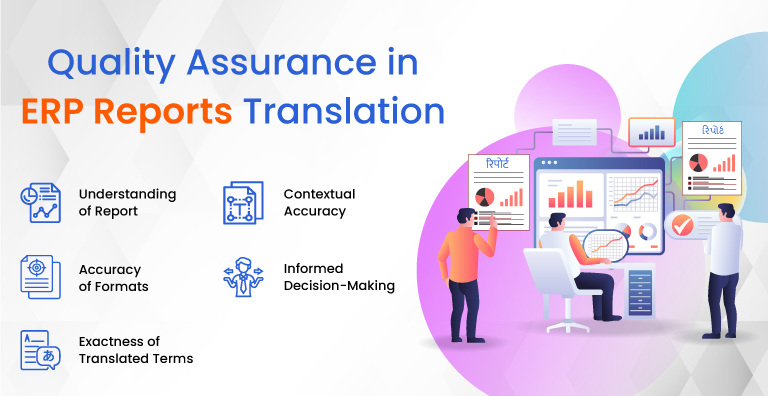ERP (Enterprise Resource Planning) platforms have emerged as empowering systems, enabling companies to manage routine business activities like procurement, accounting, HR, operations, and more. While doing that, ERPs help businesses in yet another area – reporting. ERP reporting involves analyzing and transforming data from various verticals into useful insights. The reporting collects data captured by the ERP system that integrates core business workflows and information into a unified data repository.
Often, as part of knowledge sharing, these reports have to be shared with other branches of the company. These branches might not necessarily have an English-speaking user base. Hence, ERP reports are translated and then sent to the concerned. However, since these reports are crucial, they need to be translated accurately and should have undergone rigorous quality checks. So, let’s focus on the significance of ERP reports translation quality assurance across various aspects.
What Does Translation Quality Check Involve?
Translation quality check is an extensive process taking the document through various stringent assessments. They include overall translation accuracy and the accuracy of each element, including the language, context, technical terms, terminologies and culture. In the context of ERP reports translation quality assurance, culture may not be in the picture. However, technical terms and the context will play an instrumental role in determining the translation’s quality.
Why is ERP Reports Translation Quality Assurance Important?
Translation accuracy is crucial, no matter the type of document. But when it comes to enterprise resource planning reports translation, quality assurance has a vital role to play due to factors that may include but aren’t limited to the following.
1. Clear Understanding of the Report
Translation accuracy is determined by thorough quality checks. They are aimed at helping the reader to understand the report well and interpret it with its original meaning without diluting the message or perceiving it differently.
2. Accuracy of Date, Time, and Other Formats
Another significant aspect of translating an ERP report is format accuracy, especially if the reports are to be shared across various countries. For instance, while some countries use the DD-MM-YYYY format, some use the MM-DD-YYYY format.
Translators should ensure they use the right formats to avoid confusion and misinformation. While translators make every effort to ensure they do the right thing, human errors may still spoil the show. It is here that quality checks play a vital role. Quality assurance specialists check each element and every word, including the format meticulously to deliver the highest possible levels of accuracy.
3. The Exactness of the Translated Terms and Terminologies
Translations also have to be technically correct. Translators are expected to know which terms and terminologies to translate and which ones don’t require translation. Besides, those translated have to be accurate and understandable for the target users. Quality assurance helps ensure that thorough comprehensive, and strict quality checks that take these factors as well into consideration.
4. Contextual Accuracy
Maintaining the context is another crucial aspect. Translators should ensure contextual accuracy and relevance while translating the text. A contextually accurate and relevant translation helps keep the message and its impact intact and enhances the user’s understanding of it. Quality checks not only look at linguistic and technical accuracy but also maintain the context and make necessary corrections.
5. Informed Decision-Making
ERP reports consist of vital insights, the primary purpose of which is to drive informed decisions. Inaccurate translations can convey the wrong message and lead to incorrect decisions, which could have a more profound impact at the organizational level.
Quality checks thus focus on the value that a particular piece of translation will deliver. While ensuring accuracy of expression (neither exaggerated nor inadequately expressed) to deliver the right message in the required way. It can support informed decision-making and thus pave the way to the right outcome.
Are you a company operating across multiple geographies and generating extensive ERP reports? If you look to share your ERP reports, you should preferably indulge in ERP report translation and get the latter quality checked to ensure accuracy in every aspect.
Partner with LinguaSol. With unmatched expertise in ERP report translation, we provide comprehensive ERP report translation services that involve taking the document through multiple checks and ensuring a thoroughly translated and translation quality checked ERP report. For more about our ERP reports translation services, connect with us at sales@3.110.6.243 and allow our experts to engage with you.

